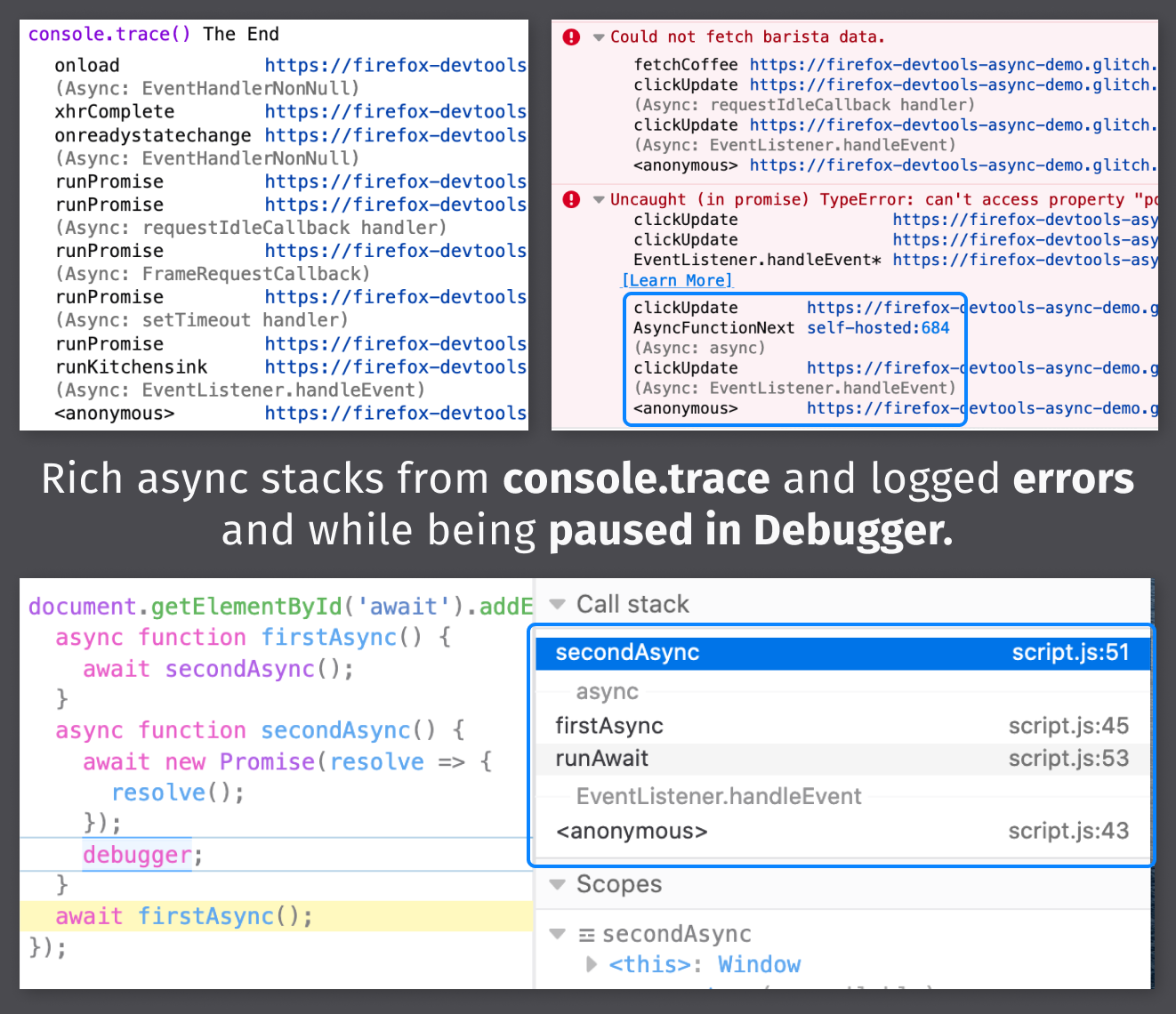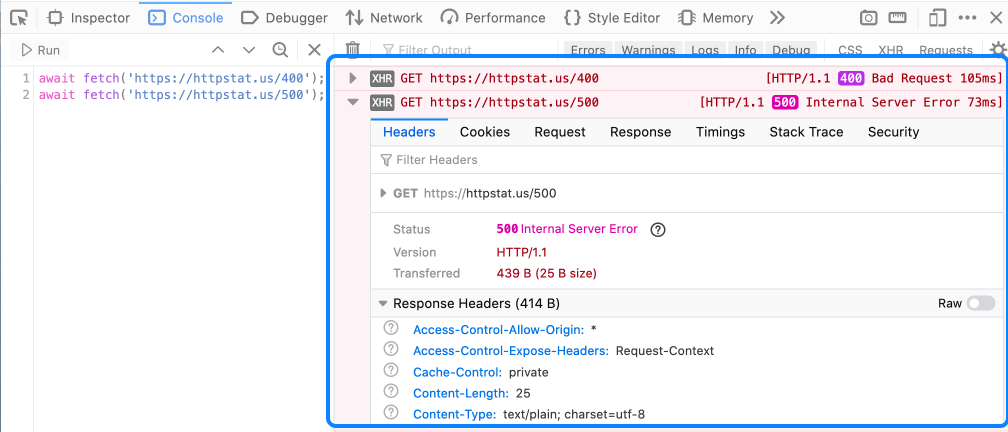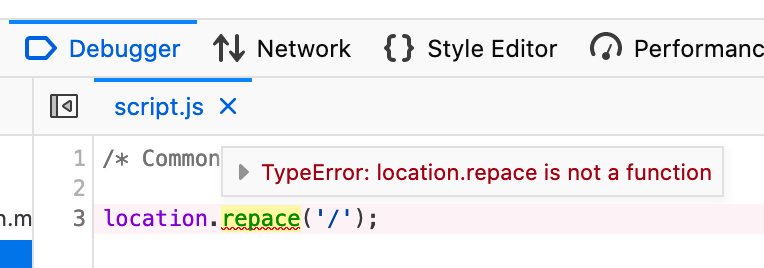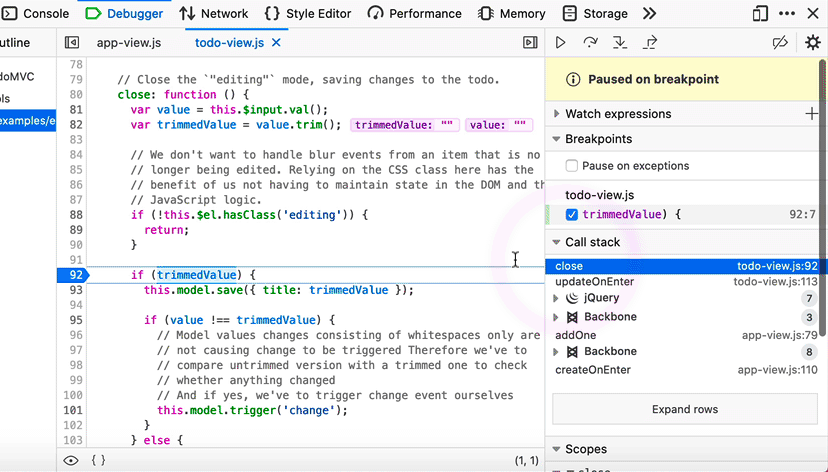A new stable version of Firefox brings July to a close with the return of shared memory! Firefox 79 also offers a new Promise method, more secure target=_blank links, logical assignment operators, and other updates of interest to web developers.
This blog post provides merely a set of highlights; for all the details, check out the following:
New in Developer Tools
First, we look at the new additions to the Firefox DevTools in version 79.
JavaScript logging and debugging capabilities
Async stack traces everywhere
Modern JavaScript depends on promises, async/await, events, and timeouts to orchestrate complex scheduling between your code, libraries, and the browser. And yet, it can be challenging to debug async code to understand control and data flow. Operations are broken up over time. Async stack traces solve this by combining the live synchronous part of the stack with the part that is captured and asynchronous.
Now you can enjoy detailed async execution chains in the Firefox JavaScript Debugger’s call stack, Console errors, and Network initiators.
To make this work, the JavaScript engine captures the stack when a promise is allocated or when some async operation begins. Then the captured stack is appended to any new stacks captured.
Better debugging for erroneous network responses
Failing server requests can lead to a cascade of errors. Previously, you had to switch between the Console and Network panels to debug, or enable the XHR/Requests filters in the Console. With Firefox 79, the Console shows network requests with 4xx/5xx error status codes by default. In addition, the request/response details can be expanded to inspect the full details. These are also available in the Network Inspector.
Tip: To further debug, retry, or verify server-side changes, use the “Resend Request” context-menu option. It’s available in both the Console and Network panels. You can send a new request with the same parameters and headers. The additional “Edit and Resend” option is only available in the Network panel. It opens an editor to tweak the request before sending it.
Debugger highlights errors in code
Many debugging sessions start by jumping from a logged JavaScript error to the Debugger. To make this flow easier, errors are now highlighted in their corresponding source location in the Debugger. Furthermore, relevant details are shown on hover, in the context of the code, and paused variable state.
We’d like to say thanks to core contributor Stepan Stava, who is already building this feature out, further blurring the line between logging and debugging.
Restart frame in Call Stack
When you restart frames from the Debugger, the call stack moves the execution pointer to the top of the function. With the caveat that the state of variables is not reset, this allows time-traveling within the current call stack.
“Restart Frame” is now available as a context-menu option in the Debugger’s call stack. Again, we have Stepan Stava to thank for this addition, which Debugger users will recognize from Chrome and VS Code.
Faster JavaScript debugging
Performance improvements in this release speed up debugging, particularly for projects with large files. We also fixed a bottleneck that affected eval-heavy code patterns, which will now just work.
Inspector updates
Better source map references for SCSS and CSS-in-JS
We’ve improved source map handling across all panels, so that opening SCSS and CSS-in-JS sources from the Inspector now works more reliably. You can quickly jump from the rules definitions in the Inspector side panel to the original file in the Style Editor.
New Inspect accessibility properties context menu
The Accessibility Inspector is now always available in the browser context menu. allows you can open the element in the Accessibility panel directly, to inspect ARIA properties and run audits.
More tooling updates
- The “Disable Cache” option in the Network panel now also deactivates CORS preflight request caching. This makes it easier to iterate on your web security settings.
- Contributor KC aligned the styling for blocked requests shown in Console with their appearance in the Network panel.
- Richard Sherman extended the reach of tooltips, which now describe the type and value for previewed object values across Console and Debugger.
- To consolidate sidebar tabs, Farooq AR moved Network’s WebSocket “Messages” tab into the “Response” tab.
- Debugger’s references to “blackbox” were renamed “ignore”, to align wording with other tools and make it more inclusive. Thanks to Richard Sherman for this update too!
Web platform updates
Implicit rel=noopener with target=_blank links
To prevent the DOM property window.opener from being abused by untrusted third-party sites, Firefox 79 now automatically sets rel=noopener for all links that contain target=_blank. Previously, you had to set rel=noopener manually to make window.opener = null for every link that uses target=_blank. In case you need window.opener, explicitly enable it using rel=opener.
SharedArrayBuffer returns
At the start of 2018, Shared Memory and high-resolution timers were effectively disabled in light of Spectre. In 2020, a new, more secure approach has been standardized to re-enable shared memory. As a baseline requirement, your document needs to be in a secure context. For top-level documents, you must set two headers to cross-origin isolate your document:
Cross-Origin-Opener-Policyset tosame-origin.Cross-Origin-Embedder-Policyset torequire-corp.
To check if cross-origin isolation has been successful, you can test against the crossOriginIsolated property available to window and worker contexts:
if (crossOriginIsolated) {
// use postMessage and SharedArrayBuffer
} else {
// Do something else
}Read more in the post Safely reviving shared memory.
Promise.any support
The new Promise.any() method takes an iterable of Promise objects and, as soon as one of the promises in the iterable fulfills, returns a single promise resolving to the value from that promise. Essentially, this method is the opposite of Promise.all(). Additionally, Promise.any() is different from Promise.race(). What matters is the order in which a promise is fulfilled, as opposed to which promise settles first.
If all of the promises given are rejected, a new error class called AggregateError is returned. In addition, it indicates the reason for the rejection(s).
const promise1 = Promise.reject(0);
const promise2 = new Promise((resolve) => setTimeout(resolve, 100, 'quick'));
const promise3 = new Promise((resolve) => setTimeout(resolve, 500, 'slow'));
const promises = [promise1, promise2, promise3];
Promise.any(promises).then((value) => console.log(value));
// quick winsLogical assignment operators
JavaScript supports a variety of assignment operators already. The Logical Assignment Operator Proposal specifies three new logical operators that are now enabled by default in Firefox:
??=— Logical nullish assignment.&&=— Logical AND assignment.||=— and, Logical OR assignment.
These new logical assignment operators have the same short-circuit behavior that the existing logical operations implement already. Assignment only happens if the logical operation would evaluate the right-hand side.
For example, if the “lyrics” element is empty, set the innerHTML to a default value:
document.getElementById('lyrics').innerHTML ||= '<i>No lyrics.</i>'Here the short-circuit is especially beneficial, since the element will not be updated unnecessarily. Moreover, it won’t cause unwanted side-effects such as additional parsing or rendering work, or loss of focus.
Weakly held references
In JavaScript, references between objects are generally 1-1: if you have a reference to one object so that it cannot be garbage collected, then none of the objects it references can be collected either. This changed with the addition of WeakMap and WeakSet in ES2015, where you now need to have a reference to both the WeakMap and a key in order to prevent the corresponding value from being collected.
Since that time, JavaScript has not provided a more advanced API for creating weakly held references, until now. The WeakRef proposal adds this capability. Now Firefox supports the WeakRef and FinalizationRegistry objects.
Hop over to the MDN docs for example usage of WeakRef. Garbage collectors are complicated, so make sure you also read this note of caution before using WeakRefs.
WebAssembly
Firefox 79 includes new WebAssembly functionality:
- First off, seven new built-in operations are provided for bulk memory operations. For example, copying and initializing allow WebAssembly to model native functions such as
memcpyandmemmovein a more efficient, performant way. - The reference-types proposal is now supported. It provides a new type,
externref, which can hold any JavaScript value, for example strings, DOM references, or objects. Thewasm-bindgendocumentation includes guidance for taking advantage ofexternreffrom Rust. - With the return of SharedArrayBuffer objects, we’re now also able to support WebAssembly threads. Thus, it is now possible for WebAssembly Memory objects to be shared across multiple WebAssembly instances running in separate Web Workers. The outcome? Very fast communication between Workers, as well as significant performance gains in web applications.
WebExtensions updates
Starting with Firefox 79, developers of tab management extensions can improve the perceived performance when users switch tabs. The new tabs.warmup() function will prepare the tab to be displayed. Developers can use this function, when they anticipate a tab switch, e.g. when hovering over a button or link.
If you’re an extension developer and your extensions sync items across multiple devices, be aware that we ported storage.sync area to a Rust-based implementation. Extension data that had been stored locally in existing profiles will automatically migrate the first time an installed extension tries to access storage.sync data in Firefox 79. As a quick note, the new implementation enforces client-side quota limits. You should estimate how much data your extension stores locally and test how your extension behaves once the data limit is exceeded. Check out this post for testing instructions and more information about this change.
Take a look at the Add-ons Blog for more updates to the WebExtensions API in Firefox 79!
Summary
As always, feel free to share constructive feedback and ask questions in the comments. And thanks for keeping your Firefox up to date!
The post Firefox 79: The safe return of shared memory, new tooling, and platform updates appeared first on Mozilla Hacks - the Web developer blog.



